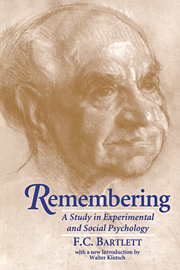Book contents
- Frontmatter
- Contents
- Biography of Sir Frederic C. Bartlett
- Introduction by Walter Kintsch
- Preface
- PART I EXPERIMENTAL STUDIES
- Chapter I Experiment in Psychology
- Chapter II Experiments on Perceiving
- Chapter III Experiments on Imaging
- Chapter IV Experiments on Remembering: (a) The Method of Description
- Chapter V Experiments on Remembering: (b) The Method of Repeated Reproduction
- Chapter VI Experiments on Remembering: (c) The Method of Picture Writing
- Chapter VII Experiments on Remembering: (d) The Method of Serial Reproduction; I
- Chapter VIII Experiments on Remembering: (e) The Method of Serial Reproduction; II. Picture Material
- Chapter IX Perceiving, Recognising, Remembering
- Chapter X A Theory of Remembering
- Chapter XI Images and their Functions
- Chapter XII Meaning
- PART II REMEMBERING AS A STUDY IN SOCIAL PSYCHOLOGY
- Index
- Plate section
Chapter XII - Meaning
Published online by Cambridge University Press: 04 August 2010
- Frontmatter
- Contents
- Biography of Sir Frederic C. Bartlett
- Introduction by Walter Kintsch
- Preface
- PART I EXPERIMENTAL STUDIES
- Chapter I Experiment in Psychology
- Chapter II Experiments on Perceiving
- Chapter III Experiments on Imaging
- Chapter IV Experiments on Remembering: (a) The Method of Description
- Chapter V Experiments on Remembering: (b) The Method of Repeated Reproduction
- Chapter VI Experiments on Remembering: (c) The Method of Picture Writing
- Chapter VII Experiments on Remembering: (d) The Method of Serial Reproduction; I
- Chapter VIII Experiments on Remembering: (e) The Method of Serial Reproduction; II. Picture Material
- Chapter IX Perceiving, Recognising, Remembering
- Chapter X A Theory of Remembering
- Chapter XI Images and their Functions
- Chapter XII Meaning
- PART II REMEMBERING AS A STUDY IN SOCIAL PSYCHOLOGY
- Index
- Plate section
Summary
DEFINITION OF THE PROBLEM
According to the views which have been developed in the preceding three chapters, the construction of psychological material and of psychological reactions into organised settings plays a leading part in perceiving, in recognising and in remembering. Whenever such settings are found, facts of ‘meaning’ emerge; for we can take any constituent part of a setting and find that it ‘leads on to’ some other, related part. We then say that its significance goes beyond its own descriptive character. It has been shown that organised settings form an essential basis of perceptual process, and that they become more important, and take on new functions, as we pass to more highly developed cognitive processes. Hence it is legitimate to say that all the cognitive processes which have been considered, from perceiving to thinking, are ways in which some fundamental ‘effort after meaning’ seeks expression. Speaking very broadly, such effort is simply the attempt to connect something that is given with something other than itself.
Consideration of this may give rise to two very different problems, which, however, are often confused. The first asks what conditions, general or specific, may be demonstrated to give rise to meaning. The second asks what meaning actually is, and what is its place in a theory of knowledge. Trouble always arises when a psychologist, having achieved some general formulation of the essential conditions of meaning, goes on to say that these actually constitute meaning.
Many theories have been put forward about meaning in the name of psychology.
- Type
- Chapter
- Information
- RememberingA Study in Experimental and Social Psychology, pp. 227 - 238Publisher: Cambridge University PressPrint publication year: 1995



